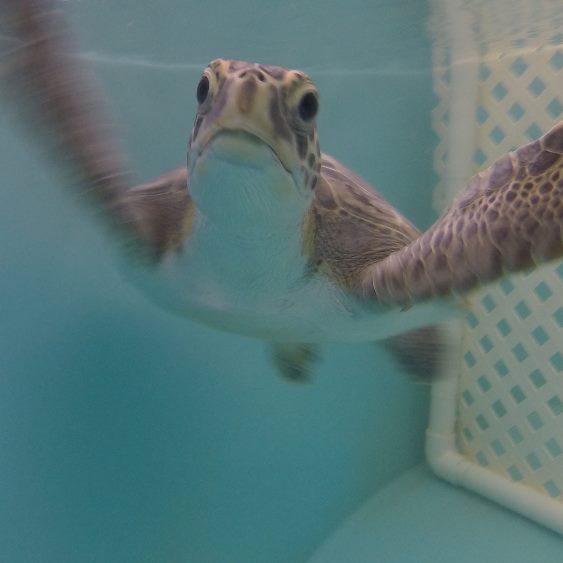 The Whitney Laboratory for Marine Bioscience
The Whitney Laboratory for Marine Bioscience

On Monday, June 20, 2016, at the River to Sea Preserve beach, the Sea Turtle Hospital at Whitney Lab released Cisco Kid. This was the hospital’s first release of a turtle treated for fibropappilomatosis, which is a disease that causes internal and external tumors to grow on the sea turtle, inhibiting normal functioning. More than 300 people attended the release.
Cisco Kid, a juvenile green sea turtle, was found stranded on Hammock Beach in Palm Coast, Fla., on Jan. 29, 2016. Cisco Kid arrived at the hospital anemic and also had several large fibropapillomatosis tumors. Fibropapillomatosis is associated with a disease that is similar to herpes that sea turtles can get in the wild. While the cause is unknown, the disease has been documented in all species of sea turtles and is most common in green sea turtles, like Cisco Kid.
By April, Cisco Kid was healthy enough for surgery to remove his/her tumors. A carbon dioxide laser was used to remove the tumors, making Cisco Kid the first Sea Turtle Hospital at Whitney Lab patient to receive such laser surgery. This is the most effective way to remove the tumors because it reduces bleeding, is less painful and shortens recovery time. Cisco Kid completely healed and was ready for release.
Now, Cisco Kid is swimming in his/her home environment. The Sea Turtle Hospital at Whitney Lab team extends a huge thank you to everyone who attended the release to wish Cisco Kid a warm farewell.
The Sea Turtle Hospital at Whitney Lab opened in October 2015 to provide rehabilitation, education and research for sea turtle conservation in Northeast Florida. The hospital rehabilitates debilitated and injured sea turtles, and, once healthy and cleared by the veterinarian, releases them back to their habitat. The hospital also researches fibropapilloma disease, which is increasingly impacting sea turtles in Northeast Florida waters.